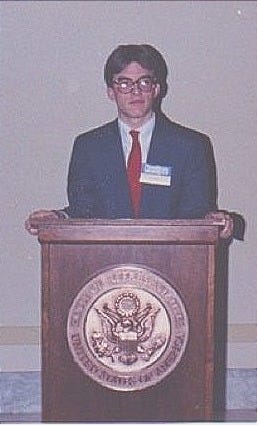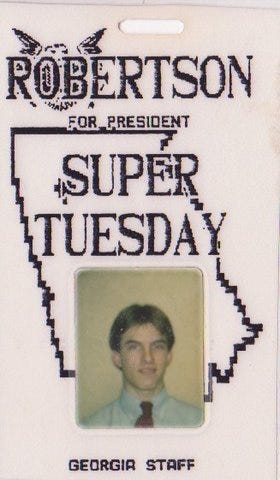Principle Over Party
I thought faith and party were one. A sign raid, a public resignation, and a few hard nos taught me to stop baptizing power.
6:00 a.m., Shoney’s
We slid into a booth at Shoney’s in Roswell on Holcomb Bridge Road with our hands bleeding. Hours earlier we’d blown past a clear directive—no sign shenanigans—and spent the night yanking opposition signs, finishing with a plywood monster just off the road. Under the fluorescent hum, our campaign manager looked down at our bandaged palms and asked, with disgust, “What happened?”
“There was no cost. That was the danger. I had violated a principle without consequence, which makes it far too easy to keep doing the wrong thing for the ‘greater good.’”
We didn’t want to talk about it. He confronted us anyway. In the dark it felt like hustle. In the diner it looked like what it was: a small betrayal disguised as strategy. There was no cost. No arrest, no demotion, no scandal. And that was the danger. I had violated a principle without consequence, which makes it far too easy to keep doing the wrong thing for the “greater good.”
Why tell this now? Because “no-cost” shortcuts are everywhere again—renamed strategy, optimized for engagement—and we’re training ourselves to believe that someone else’s wrong licenses our own.
Altar Call — When faith and party felt like the same house
County Teenage Republicans president, active statewide—the kid who could read precinct maps like a bus schedule.
Leadership Institute trainings taught me how to build youth operations: walk lists, phone banks, campus coalitions.
At sixteen I even landed a paid role on Pat Robertson’s 1988 presidential campaign, white-knuckling my new license through Atlanta traffic to make it to the office.
It felt righteous to have my Bible and my ballot point the same direction—it simplified the world.
But zeal without guardrails makes shortcuts feel righteous. The first one found me at 6:00 a.m.
First Heresy — Choosing power in miniature
That sign raid was my first heresy. Not villainy—rationalized zeal. They did it first. We’re just correcting optics. It’s only signs. Cheap slogans; corrosive habit. It was also early whataboutism—the reflex to excuse my own shortcut by pointing to someone else’s (whataboutism: excusing my wrong by pointing to yours). That move has become rampant in our politics, and it trains the soul to believe that someone else’s wrong licenses mine. A year or so later, when another line got crossed, I didn’t negotiate with myself—I stood up and left.
Public Repentance — The loud no
At Auburn University, I joined College Republicans leadership—until a local campaign crossed lines I couldn’t justify. I didn’t fade out. I resigned in a meeting, saying, “I won’t be part of an organization willing to sacrifice principles.”
The cost was real: I became persona non grata. I changed my major from political science to geography, left political activism altogether, and changed the trajectory of my life.
Second Temptation — The call before the answer
Years later, the past circled back. In the mid-2000s, Pat Swindall—the same congressman I’d worked for as a teenager—invited me to join a state Capitol-adjacent office project for lobbyists and legislators. We met in a café near the Capitol; he sketched floor plans on a napkin. I could feel the old flattery tugging.
I didn’t call an old friend right there. Later that week, I did. He knew Pat well and was blunt: don’t work with him; you can’t trust him. That told me enough. I told Swindall no—directly—without explaining my misgivings or the call. Growth, for me, looked like restraint.
Witness — Principle over tribe
By the mid-2000s I still leaned conservative and always voted Republican, but my district had Cynthia McKinney—far left and often airing conspiratorial claims. I joked on my blog that if no one decent ran against her, I would. Local press noticed; attention followed; Hank Johnson stepped up.
In a safely Democratic district, a Republican wasn’t going to win. So I put energy where it mattered: house meetings and targeted social media to persuade Republicans and independents to vote for Johnson over McKinney. That’s when I met Jon Ossoff, a college-aged staffer who struck me as unusually capable—more influence than you’d expect from someone still in school. (He’s now the U.S. Senator from Georgia.)
That episode started a long pattern: people on the Right assuming I’m liberal, and people on the Left assuming I’m conservative. When I critique the Right, some accuse me of switching teams; when I critique the Left, others assume a hidden agenda. I get it—tribes sort quickly. My rule is simple: start with home. Accountability begins with the community that formed you. Then, if you’ve earned some trust, critique across the aisle with the same facts and the same tone.
Cloud of Witnesses — Integrity inside the machine
Back in high school I’d met Gabriel Sterling through Leadership Institute trainings and campaigns. For readers who don’t know him: Sterling is a lifelong Georgia Republican who oversaw major parts of the 2020 presidential election operations in Georgia (and served as COO in the Secretary of State’s office). When false claims and threats spiraled, he stood at the microphones, publicly debunked misinformation, and warned his own side that the rhetoric could lead to violence. We came up in the same trainings and campaigns. He stayed inside the machine and said the hard thing anyway. I needed to see that—proof that leaving isn’t the only path to a spine.
Confession & Rule of Life — Guardrails I owe others (and myself)
I don’t offer this as a victory lap. I miss the mark—often. One habit I’ve had to unlearn: assuming the worst about political “opponents.” Confession isn’t weakness; it’s how humility gets traction. So I keep a short rule of life:
No rumor laundering. If I can’t say it plainly and defend it, I won’t imply it.
No dehumanizing. Disagree hard; don’t turn opponents into props.
No loyalty oath to a letter. I’ll bless, critique, or resist any party as conscience requires.
No pretending I’m above it. If I slip (and I will), I’ll say so and make it right.
I won’t punch down. No dunking on private citizens, junior staff, or volunteers; hold leaders—people with power—accountable.
No fear-mongering. I won’t exaggerate risks or use apocalyptic language to mobilize “my side.” I’ll name real risks plainly, show evidence, and offer proportionate actions.
Benediction — Closing the loop
I used to leave rooms with bandaged hands and clever excuses. Now I’d rather walk out with clean hands and fewer invitations. I will keep saying no to shortcuts so my yes can still mean something. That’s not sanctimony. It’s survival—for my soul first, and for the kind of public life I can live with.
Question for readers
What’s one moment you chose principle over tribe—and what did it cost (or save) you?



